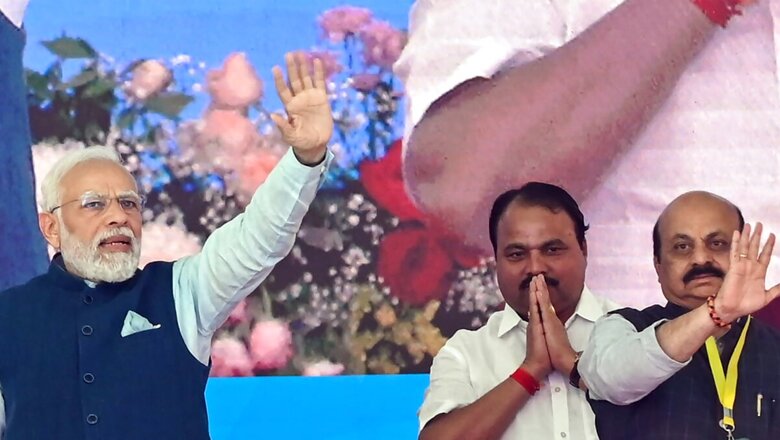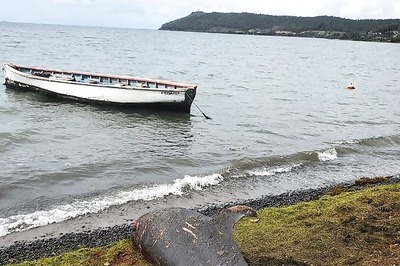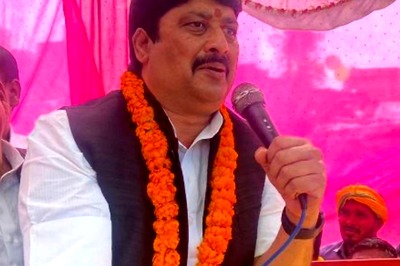
views
PM Narendra Modi unveiled Terminal 2 of Kempegowda International Airport (KIA) at Bengaluru in November 2022, constructed at a cost of Rs 5,000 crore. The terminal, known as T2, is spread across 255,645 sqm and holds the capacity to cater to 25 million passengers annually.
This is Phase 1 of the terminal which holds 22 gates, 17 security check lanes and nine baggage claim belts apart from 40 departure gates, including 10 e-gates, and 40 arrival gates, including six e-gates, and 20 visa-on-arrival bays. The new terminal has been themed ‘Terminal in a Garden’ to represent Bengaluru, the Garden City.
PM Modi is changing the growth paradigm of India by ensuring public-private partnership in key areas. Airport operation by private companies will ensure consumers get the best services and also end the typical babu culture in airports. Close on the heels of the T2 terminal, the Bengaluru-Mysore expressway that aims to decongest the traffic movement between Bengaluru and Mysore and reduce the travel time from over three hours to barely 75 minutes, was inaugurated by PM Modi on March 12, 2023.
The 119-km Bengaluru-Mysore expressway project is a 6-10 lane access-controlled highway developed at a cost of Rs 8,480 crore and is an architectural marvel. This expressway project consists of two phases: a 58 km-long Phase 1 between Bengaluru and Nidaghatta, and a 61 km-long Phase 2 between Nidaghatta and Mysore. It has 19 large bridges, 44 small bridges and four railway overbridges (ROBs) and 50 underpasses for vehicles and pedestrians.
In addition, it also comprises greenfield sections that form bypasses around Bidadi (7 km), Ramanagara-Channapatna (22 km), Maddur (7 km, including 3.5 km of elevated highway), Mandya (10 km) and Srirangapatna (7 km). The work for the project started in May 2019 and has been completed in record time.
The adjoining service and bypass roads are also being refurbished and readied, so that bikers and two-wheelers can ride on these service roads.
Opposition parties have been trying to needlessly fuel controversies regarding toll rates but the truth is, with this expressway, not only will commuters save time but also save fuel and the resultant cost savings due to fuel are much higher than the toll rates. So in the final analysis, the commuters are much better off, with the added advantage of an excellent drive-through experience.
As for the demands for an underpass near Hanakere in Karnataka’s Mandya district, NHAI officials have already informed that a proposal for the underpass was pending before it and construction would begin once the project is approved, soon enough.
Speaking of infra projects, the longest railway platform in the world at Hubballi- Dharwad has registered its name in the Guinness Book of World Records. The 1,507-metre-long platform, inaugurated by PM Modi recently, has been built at a cost of about Rs 20 crore. The Hubballi station is an important junction in Karnataka and a major hub of trade and commerce. It connects the railway lines towards Bengaluru (Davanagere side), Hosapete (Gadag side) and Vasco- Da Gama, on the Belagavi (Londa side).
The longer platform will help cater to the increasing transportation needs of the city and will also enhance the operational capacity of the yard. It will also facilitate multiple trains to simultaneously start from two directions.
Additionally, the electrification of the Hosapete-Hubballi-Tinaighat railway section and the upgrading of the Hosapete station, aimed at improving connectivity in the area will ensure uninterrupted train operations using electric power. The newly renovated Hosapete station inspired by the Hampi monuments will offer contemporary amenities to passengers.
The PM also recently inaugurated the commencement of the Dharwad Multi Village Water Supply Scheme, estimated to cost more than Rs 1,040 crore. A decision to set up an AIIMS at Dharwad has also been taken. Additionally, PM Modi laid the foundation stone for the Tupparihalla Flood Damage Control Project, which is expected to cost around Rs 150 crore and is aimed at mitigating damage caused by the floods.
Foundation stone of Mysore-Kushalnagar 4-lane highway was also laid down by PM Modi recently. These infrastructure projects worth thousands of crores are part of efforts by the double-engine government towards the people of Karnataka. The Bharatmala and Sagarmala projects are additionally transforming the landscape of India and Karnataka today. Of the over Rs 10 lakh crore that has been allocated for infrastructure development, the Modi government has already invested more than Rs 1 lakh crore in highway-related projects in recent years, with Karnataka being a huge beneficiary.
The Bengaluru-Mysore Expressway crosses through the heritage towns of Ramnagar and Mandya. The potential for tourism will not only get a boost but accessibility to the birthplace of Maa Kaveri will also be made possible. The Bengaluru-Mangaluru highway which had always been affected by landslides during the monsoons, impacting the port connectivity in the region, will now be addressed by the widening of this highway. The industries in the region will also start to flourish with the increased connectivity. The detailed project report (DPR) process for a brand new airport at Raichur has also been approved.
Apart from providing solutions to the small issues faced by the farmers of Karnataka, the Modi government has directly transferred Rs 12,000 crore into the bank accounts of the farmers of Karnataka via PM Kisan Samman Nidhi Yojna where more than 2.75 lakh farmers belonging to the Mandya region alone have been provided Rs 600 crore.
India received record foreign investments in 2022 and Karnataka was the biggest beneficiary, receiving investments of more than Rs 4 lakh crore. This record investment highlights the efforts of the double-engine government. Among the significant achievements of the double engine BJP government in Karnataka are
- 48 lakh toilets built under the Swachh Bharat Mission
- Clean drinking water has been provided to about over one crore households under the Jal Jeevan Mission scheme
- Under Pradhan Mantri Awas Yojana, over 7 lakh houses have been sanctioned
- Under the Ujjwala Yojana, free gas facility to over 31.5 lakh households has been provided
- Increase in reservations for SCs from 15% to 17% and for STs from 3 to 7%
- Employment of 11,136 civil workers has been made permanent
- Under Ayushman Bharat scheme, 31.74 lakh cards have been distributed, of which 14.44 lakh beneficiaries have already been treated at a cost of Rs 1,311.33 crore
- To curb the menace of conversion in the Karnataka, the state BJP government has enacted the Anti-Conversion Bill
- The Prohibition of Cow Slaughter Act was enacted and construction of cow sheds across the state has happened on a war footing
- A Rs 5,000 subsidy is being given by the state government to each of the 30,000 pilgrims of the Karnataka travelling by Bharat Gaurav Kashi Yatra train to holy pilgrimage places like Kashi, Ayodhya, Prayagraj
- Under the Belaku scheme 1.44 lakh households in rural areas have been provided electricity connection, which has been implemented since September 1, 2021
- Under the Shepherd Self Reliance scheme, measures to provide 20 sheep and 1 goat to the shepherds at an estimated grant of Rs 354 crore has been done
- Rs 462.12 crore stipend through DBT to a total of 2.97 lakh students to encourage education for children of construction workers
- Under the Raita Vidyanidhi scholarship scheme, 10 lakh students of the state are being given scholarships ranging from a minimum of Rs 2,500 to a maximum of Rs 11,000
- Voluntary sanction of pension to 49,281 beneficiaries under Door-to-Door Pension campaign out of a total of 71,632 eligible beneficiaries
- Around 32,159 guest teachers have been appointed in government primary high schools and 3,718 guest lecturers in pre-graduate colleges
- Coastal (Mangalore, Udupi and Karwar) Janategoskara Sagar Mala program has sanctioned 24 projects and the cost of these programs is Rs 1,774 crore
- BJP government has given scholarships to about 2 lakh fishermen’s children, 10 lakh farmers’ children and 20 lakh poor children of all categories
- A grant has been given by the BJP government in Karnataka for the construction of 5,000 houses for fishermen
- At the recent global investor meet held in Bangalore, around Rs 9.82 lakh crore of investment has been committed, of which Rs 2.83 lakh crore has already been approved
- A total of 13 most important irrigation projects of Kittur Karnataka and Kalyana Karnataka have been approved by the state BJP government, for a total of Rs 5701.38 crore
- The mantra of the double-engine BJP government is the prosperity of the poor and to that effect, the BJP government has allocated more than Rs 32,000 crore for the development of the SC/ST community under the tribal sub-scheme for the upliftment of these communities.
Under the mission of ‘Sabka Saath, Sabka Vikas’, the double-engine government in Karnataka has successfully implemented many schemes of the Modi government, making inclusive governance a top priority.
To ensure home delivery of government services, the Karnataka government has launched the Janasevaka scheme. The services include senior citizen affiliated identity and health cards, ration cards and 53 other services, especially to those who are immobile. The scheme will be successfully implemented with the help of 11 departments.
Similarly, the Janaspandana scheme is an integrated public grievance redressal system to fast-track grievances of the electorate. Both these schemes aim to ensure the timely delivery of government services to the people of Karnataka with the help of innovative and efficient management systems.
Out of the 189 candidates on April 11, 2023, in the first list announced by the BJP, 52 new candidates are fresh faces and have got the ticket for the first time ever. Thirty-two candidates from OBC, 20 from SC and 16 from ST communities are also in the list. This was soon followed by a second list of 23 candidates announced on April 12, 2023.
In the second list, the BJP denied tickets to seven sitting MLAs, including Channagiri MLA Madal Virupakshappa, who is in jail on charges of corruption. While the corrupt are being denied tickets within the BJP, the Congress is fielding DK Shivakumar, accused in a money laundering scam of over Rs 700 crore, from Kanakapura.
There are two women in the BJP’s second list and eight in the first list. The BJP announced its third list on April 17, 2023, wherein it has decided to field Mahesh Tenginakai from Hubbali- Dharwad Central, a seat held earlier by Jagadish Shettar, who has joined the Congress after being denied a ticket.
Much is being made of Shettar and Laxman Savadi’s shift from the BJP to the Congress. Political pundits fail to realise that prior to Uttar Pradesh assembly polls in 2022, Swami Prasad Maurya and Dharam Singh Saini left the BJP to join the SP and both lost. Hence, while the Congress camp can rejoice about ex-CM Shettar and ex-Deputy CM Savadi’s departures from the BJP, both these leaders are electorally on a weak footing currently and don’t bring any significant political heft to the electoral battlefield.
Don’t forget that under Shettar’s leadership in the 2013 assembly polls, BJP saw its tally reduced from 110 seats in 2008 to 40 seats in 2013, with vote share down by 13.9% from 33.8% in 2008, to only 19.9% in 2013. So while large sections of the media and the Congress camp are busy propping up the fortunes of the Congress and busy writing obituaries of the BJP, the ground reality is that thanks to Prime Minister Narendra Modi, Karnataka in the last five years has seen massive socio-economic growth focussed on last mile delivery, with Karnataka’s GDP at a handsome Rs 19 lakh crore and per capita income at a solid Rs 2.49 lakh, respectively.
Political observers have often written about how PM Modi had first toyed with the “change is the only constant” theory in 2007 in a taluka panchayat election in Gondal, when he was the Chief Minister of Gujarat. In 2010, Modi implemented the “no repeat” formula in the civic body elections in Ahmedabad and Surat.
The GAS (Gondal-Ahmedabad-Surat) formula’s success in cutting down anti-incumbency spurred the determination to replicate it, albeit in a limited measure in successive assembly elections of 2012 and 2017 in Gujarat, and even in the 2019 parliamentary elections, when many senior functionaries were denied tickets.
This calculated experiment of bringing in fresh blood has consistently given results and has been implemented in the cabinet formations too, both in states and at the Centre to create a positive impression among people. The aim is to negate any anti-incumbency and possible negativity arising from voter fatigue.
In fact, BJP is the only national party where ticket allocation is driven by merit and this is precisely the reason that despite replacing both Vijay Rupani and his entire cabinet of 22 members with 24 new faces in September 2022, just 15 months prior to the Gujarat elections, the BJP won a record 156 seats in, beating so-called anti-incumbency wave.
Those who claim Karnataka is not Gujarat would do well to know that when it comes to growth, equity, execution and delivery, Karnataka is no different from Gujarat. Every state yearns for development. And indeed, Prime Minister Narendra Modi has always put the interests of Kannadigas very close to his heart, ensuring inclusivity and holistic development.
Sanju Verma is an Economist, National Spokesperson of the BJP and the Bestselling Author of ‘The Modi Gambit’. Views expressed are personal.
Read all the Latest Opinions here




















Comments
0 comment